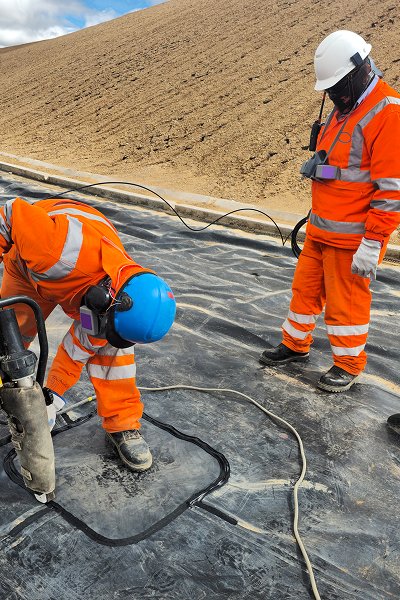What is Geo Membrane Sheet ?
Geo membrane sheet is an anti-seepage film made of polymer materials. Common types include HDPE (high-density polyethylene), LLDPE (linear low-density polyethylene), PVC (polyvinyl chloride), etc. It is characterized by good flexibility, excellent anti-seepage performance, chemical corrosion resistance, and long service life. It is widely used in various anti-seepage, isolation, and coating scenarios.
In the oil and gas industry, crude oil, natural gas, sludge, oily wastewater, chemical agents and other substances are highly corrosive and polluting, and extremely high requirements are placed on the performance of anti-seepage materials. Geo Membrane Sheet has an irreplaceable and important position in oil and gas field engineering because of its excellent protection ability.
Application scenarios of Geo Membrane Sheet in the oil and gas industry
Impermeable lining for crude oil storage tank area
The laying of HDPE geomembrane at the bottom and around the oil storage tank or oil tank area can effectively prevent the leakage of liquid from the bottom of the tank into the underground and protect the soil and groundwater.
Drilling mud pool/mud solidification field
The highly corrosive mud and chemical additive mixture generated during the drilling process must be temporarily stored in a strictly impermeable storage tank. Geomembrane forms a stable coating structure and is a standard material for the construction of drilling fluid field.
Sewage oil water regulating tank and separation tank
It is used to store and treat the sewage oil water recovered from the wellhead or gathering and transportation site to prevent the penetration of pollutants. It is an impermeable structure that must be set up in refineries and gathering and transportation sites.
Oil and gas field waste storage area
A large amount of waste solids and liquids will be generated during drilling and operation. Geo Membrane Sheet can be used as a cover layer and bottom lining layer to provide a barrier for the safe temporary storage and final treatment of waste.
Chemical pools and emergency pools in refineries
Chemical pools and emergency pools require membrane materials to have good chemical corrosion resistance and thermal aging resistance, and Geo membrane provides reliable protection.
Isolation layer of oil field roads and construction platforms
Some geomembranes can be used to isolate and reinforce soft soil foundations, or to lay cushion layers to maintain clean working areas and prevent crude oil leaks from affecting the operation of large equipment.


How does Geo Membrane Sheet perform the role of oil and gas anti-seepage?
1. Extremely low permeability coefficient
The permeability coefficient of high-quality HDPE membrane can be as low as 10⁻¹³ cm/s, which can almost achieve "zero leakage", especially suitable for the high pollution environment requirements of oil and gas fields.
2. Excellent chemical resistance
Geo membrane can resist the corrosion of crude oil, acidic water, salt solution, alkaline mud, etc. for a long time, is not easy to degrade or soften, and is an ideal material to replace concrete and clay.
3. Strong flexibility and easy laying
It is particularly suitable for irregular terrain and large-scale construction. It can be efficiently transported, laid and welded by coils, saving construction period.
4. A complete welding system can be realized
The overall seamless structure can be formed by hot-melt welding, and the weld strength is almost equal to or better than the parent material, ensuring the integrity and reliability of the overall anti-seepage system.
5. High cost performance and long service life
It can be used stably for more than 30 years in an underground environment, and the comprehensive economic benefits are far better than traditional concrete or anti-seepage clay layers.
Geo Membrane Sheet Special Treatment
Anti-static Treatment
In the highly flammable and explosive environment of oil and gas fields, static electricity accumulation can cause ignition sources, so the membrane surface must be conductive to avoid charge accumulation.
Technical means
An anti-static layer containing carbon black or conductive polymer is co-extruded on the surface of the geomembrane;
The surface resistance is controlled within the range of 10⁶–10⁹ Ω;
The conductivity is kept stable for a long time without affecting the membrane's impermeability.
Nano-barrier Enhancement
Nano-barrier particles (such as montmorillonite, graphene, silicon nanoparticles, etc.) are added to the polymer matrix to construct a maze-like barrier path at the microscopic level, significantly reducing the molecular penetration rate.
Performance
The permeability is reduced by 10-100 times;
The ability to resist the penetration of volatile organic compounds (VOCs) is improved;
The membrane thickness can be moderately thinned without affecting the anti-seepage performance.
High-Temperature Resistance Material Modification Technology
The Middle East, Africa and the oil fields in western China have a hot and dry climate, and the surface temperature often exceeds 60°C. Conventional HDPE geomembranes are prone to softening, aging and deformation.
Technical Direction
Adding thermal antioxidants (such as HALS, anti-UV additives);
Blending EVA (ethylene-vinyl acetate) or metallocene polyethylene to improve flexibility and thermal stability;
The surface is covered with a heat-reflective coating (white coating) to reduce heat absorption.
Geo Membrane Sheet has the characteristics of high anti-seepage, corrosion resistance, aging resistance, and customization, which builds an invisible but strong barrier for the petrochemical industry.
Geo Membrane's stronger professional capabilities enable it to not only adapt to the extremely high temperature, drought and wind erosion environment in the Middle East, Africa, Northwest and other regions, but also fully meet industry requirements in terms of anti-static, chemical corrosion resistance, structural composite, surface enhancement, welding and sealing.


